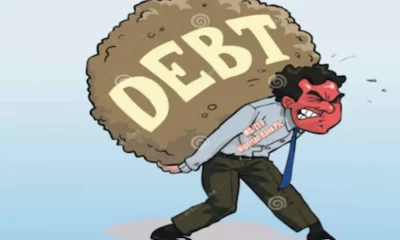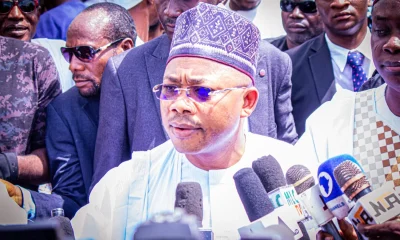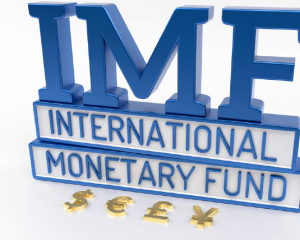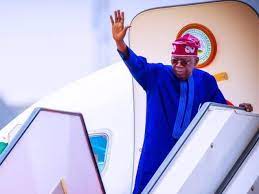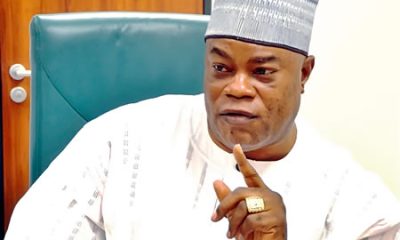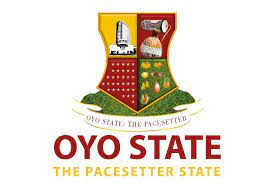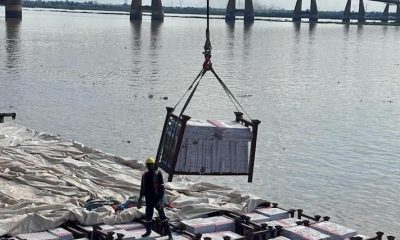BUSINESS
Nigeria’s Debt Stock Hits N39.6tn in 11 Months – Reports

The Nigeria’s total debt stock rose from N32.9tn as of December 2020 to N39.6tn in November 2021 according to a document from the Ministry of Finance, Budget and National Planning.
The Minister of Finance, Budget and National Planning, Mrs Zainab Ahmed, in her presentation of the 2022 approved budget, disclosed that the government borrowed N6.
7tn between January and November 2021.The new borrowing in the period under review consists of N5.
1tn domestic debt and N1.6tn. The domestic debt, however, includes borrowing from the Central Bank of Nigeria, according to the presentation document.In March 2021, the Debt Management Office had disclosed that the country’s total public debt stock was N32.
9tn as of December 2020.An additional N6.7tn loan means the total public debt stock would be about N39.6tn as of November 2021.
The DMO had disclosed that the country’s total public debt increased to N33.1tn at the end of the first quarter of 2021, from N32.9tn in December 2020, showing an increase of about 200bn.
In Q2 2021, the total debt stock rose by N2.4tn to N35.5tn by June 2021.
The increase continued by N2.5tn to hit N38tn by Q3 2021, which was the last figure provided by the DMO.
However, based on the minister’s presentation, there was an increase of N1.6tn from September to November 2021.
The minister defended government borrowing and the country’s debt level, insisting the country had a revenue challenge, and not a debt problem, adding that the debt level was still within sustainable limits.
She had said, “This is to restate, that the debt level of the Federal Government is still within sustainable limits. Borrowings are essentially for capital expenditure and human development as specified in Section 41(1)a of the Fiscal Responsibility Act 2007.
“Having witnessed two economic recessions we have had to spend our way out of recession, which contributed significantly to the growth in the public debt. “It is unlikely that our recovery from each of the two recessions would have been as fast without the sustained government expenditure funded partly by debt.”
However, economic experts, including a former Deputy Governor of the Central Bank of Nigeria and former presidential candidate, Kingsley Moghalu, have countered the minister.
Moghalu had said, “There are many ways through which we can improve Nigeria’s domestic revenue situation without selling the future of our country. As to the argument that Nigeria does not have a debt problem but a revenue problem, that is mere sophistry. If you’re spending 90kobo of every one naira you earn repaying debt, you are insolvent.
“You cannot say that we have a debt-to-GDP ratio that allows you to continue borrowing. No! That is an argument for sustainable economies. You cannot be comparing Nigeria with advanced economies. We are in an economy that is still very basic.
“If you are not earning enough revenue, why are you borrowing? You are just compounding your problem. Why don’t you focus on where to get the revenue from instead of lazily ignoring that problem and just trying to survive with borrowing?
“If an individual was living a life that way, it would be a calamity. That is why Nigeria is in a calamitous situation today economically,” he said.
The World Bank had recently said Nigeria’s debt was vulnerable and costly, adding that the country’s debt was at risk of becoming unsustainable in the event of macro-fiscal shocks.
BUSINESS
FG Pushes for Modern Equipment to Boost Manufacturing

The Federal Government has said that Nigeria must transition from importing used industrial scrap to deploying world-class, resilient manufacturing solutions as part of efforts to reposition the sector for global competitiveness.
The Minister of State for Industry, Sen.
John Enoh, stated this on Wednesday during the 2025 edition of the Nigeria Manufacturing and Equipment/Nigerian Raw Materials Expo held in Lagos.Enoh declared that Nigeria could not continue to rely on outdated and imported equipment if it hopes to achieve true industrial sovereignty.
He said, “We must move from importing used, you know, industrial scrap, because most of them, that’s what they are, to deploying world-class solutions built for resilience, for sustainability.
”The minister noted that manufacturing currently contributes less than 10 per cent to Nigeria’s Gross Domestic Product and that the government is working to reverse the trend by prioritising domestic production and adding value to local raw materials.
He added that the government was finalising a Draft National Industrial Policy, which would place technology adoption, equipment financing, and power integration at the core of manufacturing innovation.
The industry minister noted that the policy is also aligned with President Bola Tinubu’s Renewed Hope Agenda, particularly the goal of diversifying Nigeria’s economy across key sub-sectors, including textiles, automotive, and agro-processing.
Enoh commended the Manufacturers Association of Nigeria, the Raw Materials Research and Development Council, and other stakeholders for working collaboratively to develop a “fit-for-purpose” policy framework.
He explained that through the planned Made-in-Nigeria campaign, likely to be anchored by the Pro-Nigeria Secretariat, the Federal Government would support certification, digital marketplaces, and media visibility for locally produced equipment and innovations.
The Minister also revealed that the government is harmonising efforts across ministries and agencies such as the Bank of Industry, the Nigeria Export Processing Zones Authority, the Nigeria Industrial Policy Council, and the National Agency for Science and Engineering Infrastructure.
He urged Nigerian manufacturers and innovators to see the Expo not just as a marketplace but as a mandate to forge strategic technology transfer partnerships and explore modular, mobile, and decentralised equipment models for underserved regions.
He also urged the stakeholders to collaborate with tertiary institutions to co-design Nigeria-specific machines and define sustainability as industrial sovereignty and inclusive economic development.
President of the MAN, Francis Meshioye, in his remarks, described the expo as an opportunity to transform intentions into innovation and enhance Nigeria’s industrial competitiveness.
He said, “We embarked on a remarkable journey, not just about showcasing capabilities, but about exploring partnerships, innovation, and sustainable practices that can propel our industry to prosperity.”
Meshioye commended participants for their enthusiasm and urged stakeholders to reflect on how insights from the event could reshape business strategies.
“The theme of this year’s expo, ‘Accelerating Sustainable Manufacturing Through Cutting-Edge Equipment and Technology Solutions’, strongly resonates with our industry’s needs,” he said.
He added, “We must make manufacturing desirable, attractive, and a household name.”
Highlights of the day included panel discussions on sustainable innovation and technology transfer in manufacturing, the growth mindset of women in manufacturing and leveraging international partnerships.
The panellists included the Consul General of India in Lagos, Chandramouli Kern; Chief Executive Officer of PROPAK, George Pearson; Senior Trade Consultant (West Africa), VDMA, Kayode Jegede; and CEO of Open Access Data Centres, Dr Ayotunde Coker, among others.
The three-day expo brought together key government agencies, private sector players, equipment manufacturers, innovation hubs, and academia to deliberate on strategies to deepen local production capacity, reduce reliance on foreign inputs, and build an inclusive, sustainable industrial future.
BUSINESS
Toyota Cuts Profit Forecast Due to US Tariffs

Japanese auto giant Toyota on Thursday cut its annual net profit forecast to 2.66 trillion yen ($18.06 billion) owing to the impact of US tariffs.
“Due to the impact of US tariffs and other factors, actual results showed decreased operating income, and the forecast has been revised downward,” the company said in a statement.
Its shares fell 0. 6 percent in Tokyo afternoon trade.The Trump administration in April imposed a 25 percent levy on Japanese cars imported into the United States, dealing a hefty blow to Japan and its crucial auto sector.
Although Tokyo and Washington announced a trade deal in July, lowering that rate to 15 percent and providing a degree of relief for the industry, it’s not yet clear when it will take effect.
There is also confusion over whether the car tariff — as well as other “reciprocal” levies — will be capped at 15 percent, or if these would come on top of those in place before Trump’s trade blitz.
The auto industry had a pre-existing 2.5 percent tariff, meaning the levy currently stands at 27.5 percent.
Revenues in Toyota’s first quarter from April to June were up 3.5 percent, but net income dropped by 36 percent.
BUSINESS
Dangote Bags ‘Cement Company of the Year’ Award At Africa Housing Show

Africa’s largest cement manufacturing company, the Dangote Cement Plc, has added to its numerous accolades as it received the ‘Cement Company of the Year’ award at the just concluded Africa International Housing Show (AIHS) in Abuja.
The Dangote Cement Plc is one of the sponsors of the four-day housing exhibition that ended last Friday, where 21 countries and about 40,000 exhibitors.
participated.Presenting the award on behalf of the organizers of the show, Governor of Sokoto State, Ahmad Aliyu Sokoto, who was represented by his Deputy, Engr. Idris Mohammed Gobir, described the Dangote cement as a household name and the pride of Africa.
According to him, the Dangote Cement has supported Nigerian economy through job creation and philanthropy, among others.
The Minister for Housing and Urban Development, Ahmad Musa Dangiwa had lauded Dangote Cement Plc for its contributions to the development of the Nigerian Economy, urging the company to join hands with government in bridging the gap of Housing deficit in the Country.
Coordinator of the Show, Bar. Festus Adebayo had said that the housing deficit in the country can be mitigated through Public Private Partnership (PPP).
He said: “Innovation and collaboration are top priorities for us, given the rapid technological advancements in housing construction, financing and system improvements.”
Bar. Adebayo said he was optimistic that the partnership with Dangote Cement Plc will help address the narrative of housing shortfall in the country.
Speaking earlier, the Director General, Nigerian Building and Road Research Institute, (NBRRI), Prof. Samson Duna, said: “Dangote cement dominates the Nigeria and West Africa markets in respect of patronage and is doing well. Dangote Cement stands for standard and quality. Thumbs up for Dangote cement”.
Speaking at the company’s Special Day, the National Sales Director, Dangote Cement Plc, Dolapo Alli, said: “Addressing housing issues requires collaboration among various stakeholders, including government agencies, private developers, non-profits, and communities. The government can adopt public-private partnerships (PPPs) to support mass housing initiatives.
“Through PPP models, the government may initiate the construction of new estates, while companies and firms in the building and construction sector can be granted tax waivers and credits to facilitate the financing of new and affordable housing developments.”
A statement from the company’s spokesman Anthony Chiejina had said that the theme of the 2025 Show: Reimagining Housing Through Innovation, Collaboration and Policy” aptly resonated with its core value.

